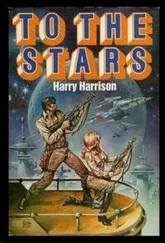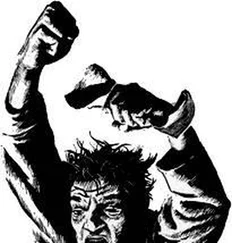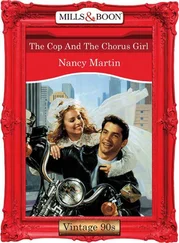His teeth showed again as he threw his head back in a wild guffaw. “Come now,” he shouted gutturally. “I one, you many. Come to fight with Ragnar. Who is great one who comes first? You. Or you.” He flourished his spear at Godwin and Wulfgar, now isolated, mouths gaping, by the fishermen still drawing respectfully back.
“We'll have to take him,” muttered Godwin, drawing his broadsword with a wheep. “I wish I had my shield.”
Wulfgar followed suit, stepping sideways, pushing back the fair-haired boy who stood a pace behind him. “Go back, Alfgar. If we can disarm him the churls will finish it for us.”
The two Englishmen edged forward, swords drawn, facing the bearlike figure which stood grinning, waiting for them, the blood and water still surging round his feet.
Then he was in motion, heading straight for Wulfgar, moving with the speed and ferocity of a charging boar. Wulfgar sprang back in shock, landed awkwardly, a foot twisting under him. The Viking missed with a lefthand slash, poised the right arm for a downward killing thrust.
Something jerked the redbeard off his feet, hurled him backward, struggling helplessly to free an arm, twisted him round and threw him heavily into the wet sand. A net. A fisherman's net. The reeve and two more jumped forward, seized handfuls of tarry cordage, jerked the net tighter. One twitched the sax from an enmeshed hand, another stamped savagely on the fingers holding the spear, breaking shaft and bones in the same movement. They rolled the helpless man quickly, expertly, like a dangerous dogfish or herring-shark. They straightened, looking down, and waited for orders.
Wulfgar limped over, exchanging glances with Godwin. “What have we caught here?” he muttered. “Something tells me this is no two-ship chieftain out of luck.”
He eyed the garments of the netted man, reached down and felt them.
“Goatskin,” he said. “Goatskin with pitch on. He called himself Ragnar. We've caught Lothbrok himself. Ragnar Lothbrok. Ragnar Hairy-Breeks.”
“We can't deal with him,” said Godwin in the silence. “He'll have to go to King Ella.”
Another voice broke in, the voice of the dark boy who had questioned the reeve.
“King Ella?” he said. “I thought Osbert was king of the Northumbrians.”
Godwin turned to Wulfgar with weary politeness. “I don't know how you discipline your people in the North-folk,” he remarked. “But if he were mine and said something like that I'd have his tongue torn out. Unless he's your kin, of course.”
In the lightless stable no one could see him. The dark boy leaned his face on the saddle and let himself slump. His back was like fire, the wool tunic sticky with blood, rasping and pulling free at every movement. The beating had been the worst he had ever suffered, and he had suffered many, many thrashings from rope and leather, bent over the horse-trough in the yard of the place he called home.
It was that remark about kin that had done it, he knew. He hoped he had not cried out so that the strangers would hear him. Toward the end he hadn't been able to tell. Pained memories of dragging himself out into the daylight. Then the long ride across the Wolds, trying to hold himself straight. What would happen now they were in Eoforwich? Once upon a time the fabled city, home of the long-departed but mysterious Rome-folk and their legions, had stirred his fervent imagination more than the songs of glory of the minstrels. Now he was here, and he only wanted to escape.
When would he be free of his father's guilt? Of his stepfather's hate?
Shef pulled himself together and began to unbuckle the girth, dragging at the heavy leather. Wulfgar, he was sure, would soon formally enslave him, put the iron collar round his neck, ignore the faint protests of his mother, and sell him in the market at Thetford or Lincoln. He would get a good price. In childhood Shef had hung around the village forge, drawn by the fire, hiding from the abuse and the thrashings. Slowly he had come to help the smith, pumping the bellows, holding the tongs, beating out the iron blooms. Making his own tools. Making his own sword.
They would not let him keep it once he was a slave. Maybe he should run now. Slaves sometimes got away. Usually not.
He pulled off the saddle and groped round the unfamiliar stable for a place to stow it. The door opened, bringing in light, a candle, and the familiar cold, scornful voice of Alfgar.
“Not finished yet? Then drop it, I'll send a groom. My father is called to council with the king and the great ones. He must have a servant behind his chair to pour his ale. It is not fitting for me to do it and the companions are too proud. Go, now. The king's bower-thane waits to instruct you.”
Shef plodded out into the courtyard of the king's great wooden hall, new-built within the square of the old Roman ramparts, into the dim light of the spring evening, almost too tired to walk straight. And yet, inside him, something stirred, something hot and excited. Council? Great ones? They would decide the fate of the prisoner, the mighty warrior. It would be a story to tell Godive, one that none of the wiseacres of Emneth could match.
“And keep your mouth shut ,” a voice hissed from inside the stable. “Or he will have your tongue torn out. And remember: Ella is king in Northumbria now. And you are no kin to my father.”
“We think he's Ragnar Lothbrok,” King Ella asked his council. “How do we know?” He looked down a long table with a dozen men seated round it, all of them on low stools except for the king himself, who was on a great carven high seat. Most of them were dressed like the king, or like Wulfgar, who sat at Ella's left hand: in brightly colored cloaks, still pulled round them against the drafts that swirled in from every corner and closed shutter, making the tallow-dipped torches flare and eddy; gold and silver round wrists and brawny necks; clasps and buckles and heavy sword-belts. They were the military aristocracy of Northumbria, the petty rulers of great blocks of land in the south and east of the kingdom, the men who had put Ella on the throne and driven out his rival Osbert. They sat on their stools awkwardly, like men who spent their lives on foot or in the saddle.
Four other men stood out against them, grouped at the foot of the table as if in conscious isolation. Three wore the black gowns and cowls of the monks of St. Benedict, the fourth the purple and white of a bishop. They sat easily, bending forward over the table, wax tablets and styli ready to record what was said, or to pass their thoughts to one another in secret.
One man made ready to answer his king's question: Cuthred, captain of the bodyguard.
“We can't find anyone to recognize him,” he admitted. “Everyone who ever stood face-to-face with Ragnar in battle is dead—except,” he remarked courteously, “the gallant thane of King Edmund who has joined us. However, that doesn't prove this one is Ragnar Lothbrok.
“But I think he is. One, he won't talk. I reckon I'm good at getting people to talk, and anyone who won't is not a common pirate. This one for sure thinks he's somebody.
“Another, it fits. What were those ships doing? They were coming back from the south, they'd been blown off course, they hadn't seen sun nor stars for days. Otherwise skippers like that—and the Bridlington reeve says they were good—wouldn't have got into that state. And they were cargo ships. What cargo do you take south? Slaves. They don't want wool, they don't want furs, they don't want ale. Those were slavers on their way back from the countries down south. The man's a slaver who's a somebody, and that fits Ragnar. Doesn't prove it, though.”
Cuthred took a heavy pull at his ale-mug, exhausted by eloquence.
Читать дальше







